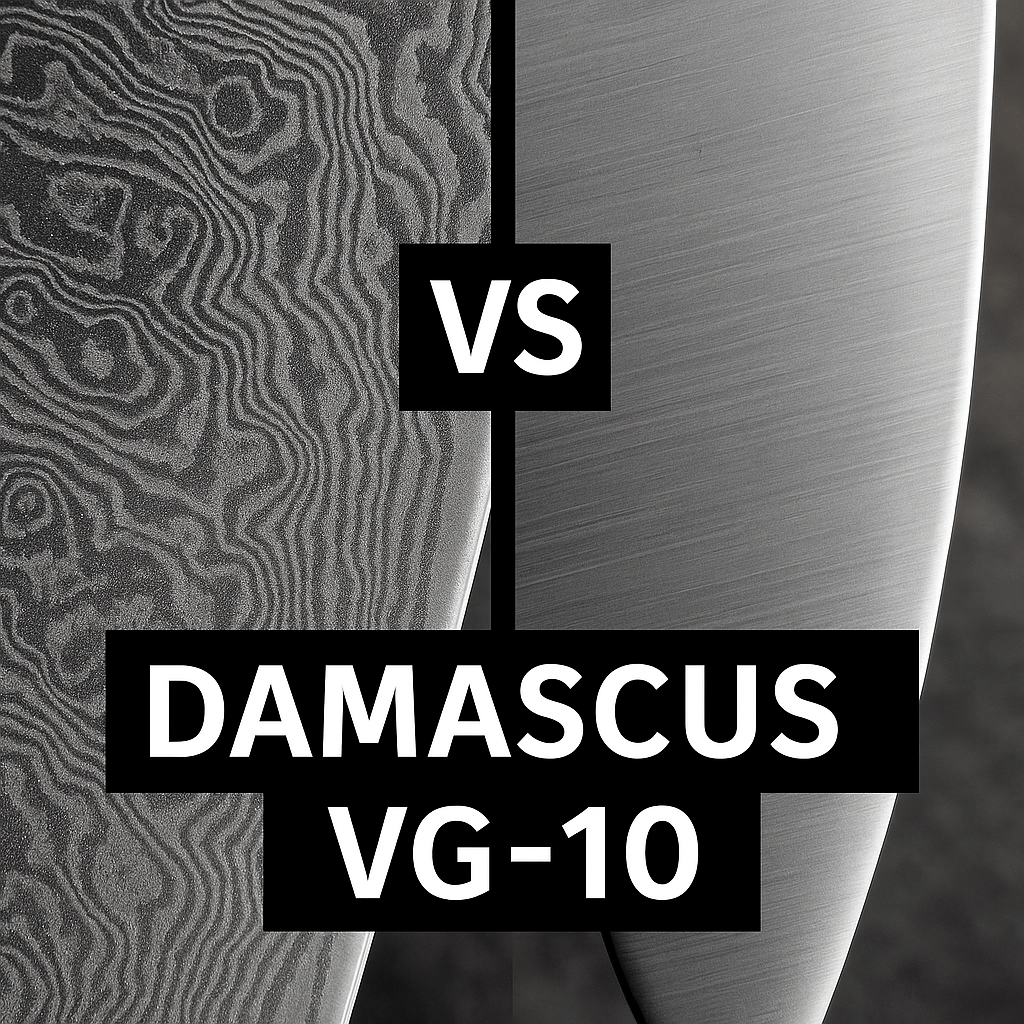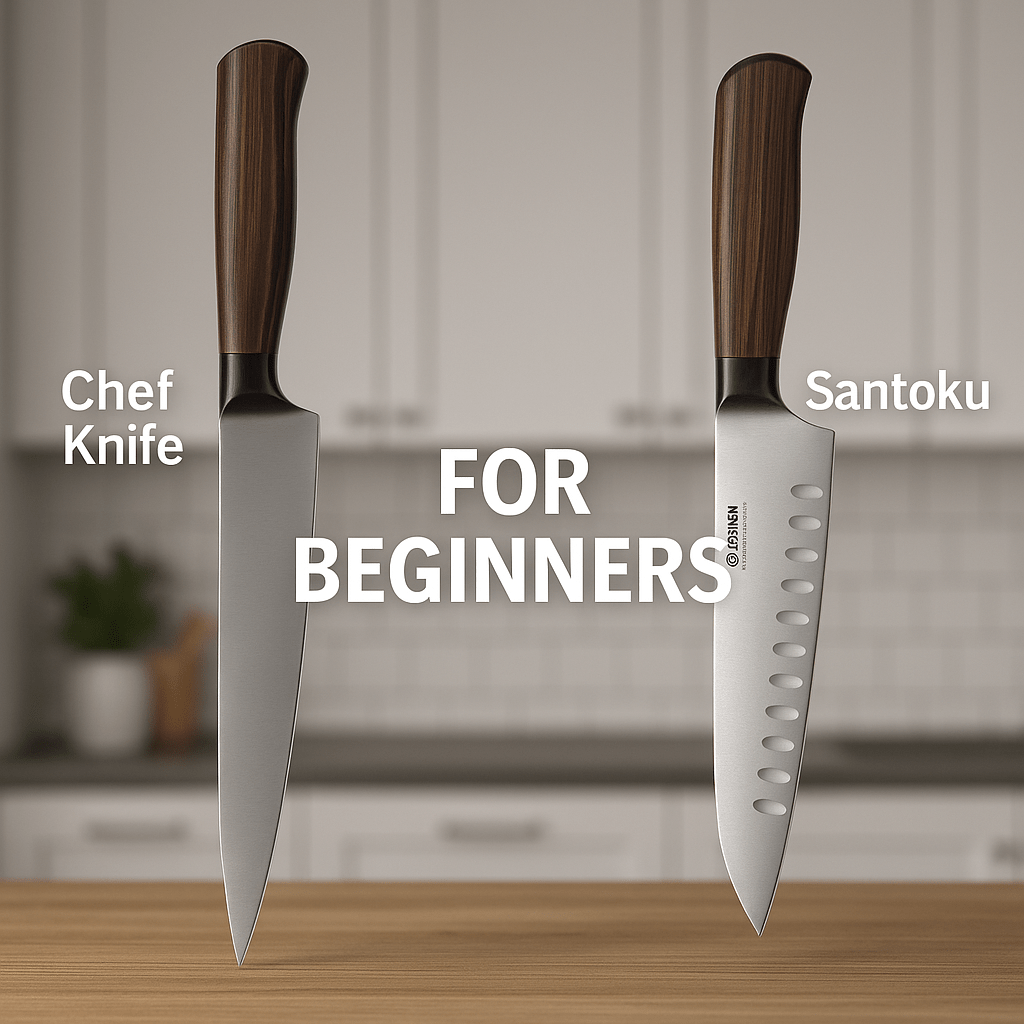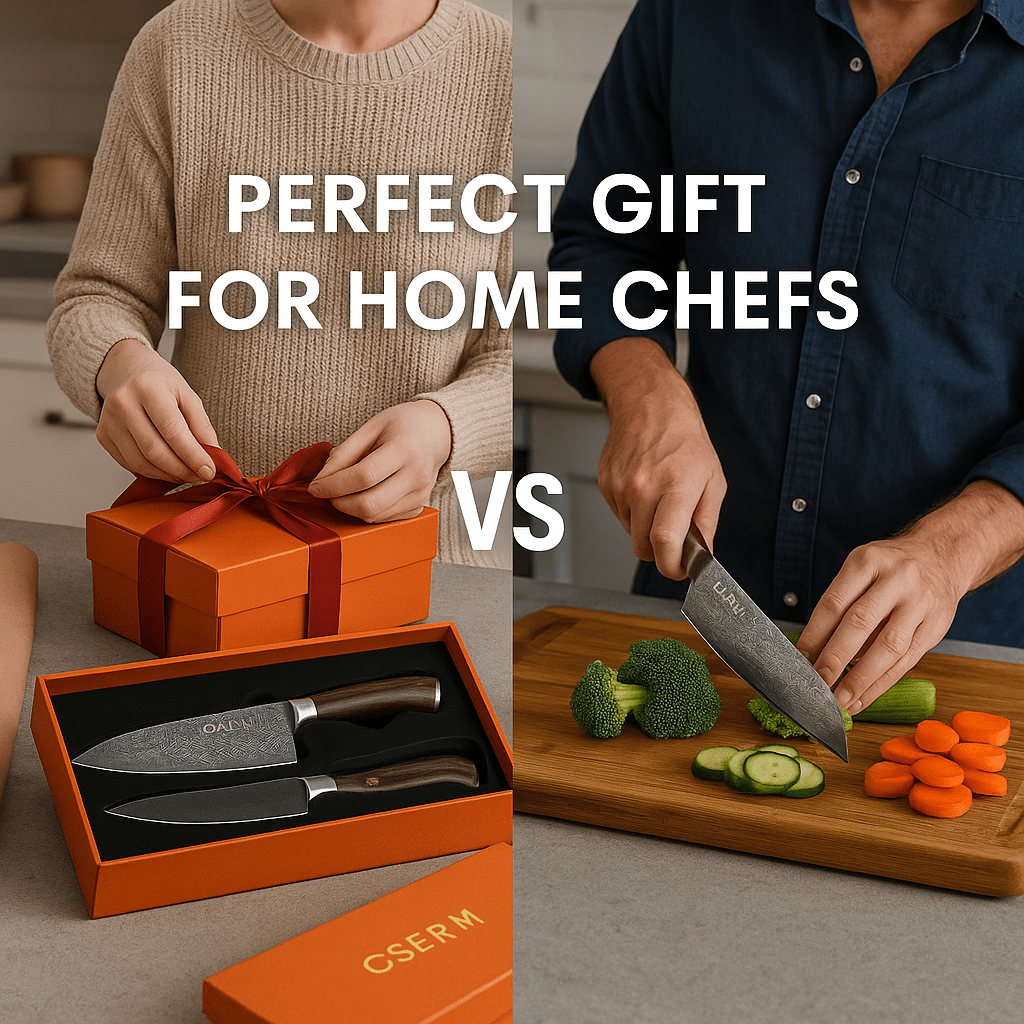
Damascus Steel vs VG-10 – Which Is Better?
When shopping for Japanese knives, you’ll often see two terms used interchangeably: Damascus Steel and VG-10 Steel. But what’s the difference between them? Are they competing materials—or do they actually work together? Let’s explore what makes each special and how they define modern Japanese craftsmanship.
What Is Damascus Steel?
Damascus Steel refers to a distinctive pattern on the blade, created by layering and folding different steels together. Traditional Damascus from ancient times originated in the Middle East, known for its wavy “water-like” patterns and unmatched toughness.
In modern Japanese knives, “Damascus” doesn’t describe the core steel but the outer layers that wrap around the blade. These layers protect the cutting core while giving the knife its signature flowing grain pattern.
- Visual Identity: Wavy or ripple-like texture unique to every blade.
- Purpose: Aesthetic beauty, corrosion resistance, and added toughness.
- Structure: Multiple layers (often 33 or 67) of alternating hard and soft steel.
What Is VG-10 Steel?
VG-10 (V-Gold-10) is a high-carbon stainless steel made in Japan, celebrated for its ability to hold a razor-sharp edge while resisting rust. It contains vanadium, molybdenum, and cobalt—elements that enhance edge retention, strength, and polishability.
Most Japanese knife makers, including OSERM, use VG-10 as the core steel (the inner cutting layer) and wrap it with Damascus cladding for protection and beauty.
- Key Properties: Hardness around 60-61 HRC, excellent corrosion resistance.
- Edge Retention: Stays sharp longer than traditional stainless steels.
- Ideal Use: Everyday kitchen knives requiring precision and durability.
How Damascus and VG-10 Work Together
Instead of being rivals, Damascus and VG-10 complement each other perfectly. Damascus forms the layered shell, while VG-10 serves as the blade’s sharp, functional core. This combination creates a knife that’s both beautiful and high-performing.
| Feature | Damascus Steel | VG-10 Steel |
|---|---|---|
| Purpose | Outer decorative & protective layers | Cutting core (inner steel) |
| Hardness (HRC) | ~58 | ~60-61 |
| Corrosion Resistance | High | Very high |
| Edge Retention | Moderate | Excellent |
| Visual Appeal | Stunning wavy patterns | Smooth polished surface |
Performance in Daily Use
A pure VG-10 knife (without Damascus cladding) will cut just as efficiently, but it won’t have the same tactile charm or layered resilience. Damascus-clad VG-10 knives, like OSERM’s collections, offer the best of both worlds—cutting precision and visual artistry.
Why Chefs Love Damascus VG-10 Knives
Professional chefs value not just sharpness but also balance, aesthetics, and emotion. The layered Damascus exterior creates a micro-cushion effect that reduces food sticking, while the VG-10 core maintains ultra-fine sharpness through prolonged use.
This fusion makes every cut smoother, cleaner, and more enjoyable—a true extension of the chef’s skill.
OSERM’s Damascus VG-10 Construction
Each OSERM knife is forged from a VG-10 core wrapped in 67 layers of Damascus steel. The result: a blade that’s incredibly sharp, corrosion-resistant, and visually breathtaking. Every knife undergoes meticulous polishing to reveal the elegant Damascus waves unique to each piece.
The combination delivers more than performance—it delivers personality. Every ripple in the steel is a story of heat, pressure, and craftsmanship.
Which One Should You Choose?
- If you want pure performance → Choose VG-10 steel knives for consistent sharpness.
- If you appreciate aesthetic beauty + performance → Choose Damascus VG-10 knives like OSERM’s collections.
In reality, most premium Japanese knives use both — VG-10 inside, Damascus outside — because perfection lies in harmony, not separation.
Conclusion
Damascus and VG-10 aren’t competitors; they’re partners in excellence. Together, they form knives that blend art and science—sharp enough for precision, beautiful enough for display. In the hands of an OSERM craftsman, they become something greater: a symbol of Japanese mastery in modern cooking.
Weekly Deal 🔥
Experience the best of both worlds with OSERM’s VG-10 Damascus Knives — razor-sharp, elegantly layered, and gift-ready in premium boxes.
You Might Also Like
- Damascus Knife vs Stainless Steel Knife – Pros & Cons
- Forged vs Stamped Knives – Which Should You Pick?
- The History of Japanese Knives – Tradition Meets Modern Cooking
Tags: damascus vs vg10, japanese steel knives, OSERM Damascus knives, vg10 core steel, japanese craftsmanship






